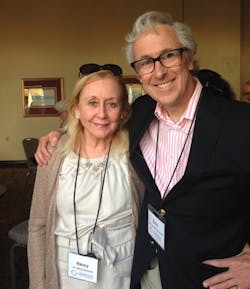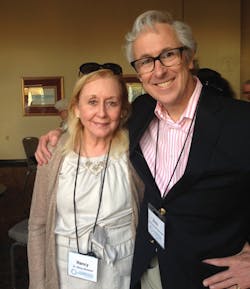A passion for oral medicine: Author interviews president of American Academy of Oral Medicine
NANCY W. BURKHART
The American Academy of Oral Medicine (AAOM) was founded in 1945. As an established organization, the academy offers resources for practitioners as well as a professional community for oral medicine-trained dentists. The AAOM defines oral medicine as the discipline of dentistry concerned with the oral health care of medically complex patients, including the diagnosis and management of medical conditions that affect the oral and maxillofacial region. Oral medicine overlaps with many specialty areas within dentistry and medicine, since many medical conditions can have oral consequences.
I became a member of the AAOM in 1997 upon joining Baylor College of Dentistry when I was appointed to the stomatology center under the department of periodontics. An oral medicine philosophy of total patient care is fundamental within the stomatology center. Over the years, I have witnessed the appointment of many presidents within the AAOM. New presidents always bring their own oral medicine philosophy to the organization and, of course, their own strengths. During the past 70 years, the organization has gained in membership and a wide variety of educators, practitioners, and researchers have joined the organization.
The academy's annual meetings bring together dental professionals from all over the world who present lectures or take part in the educational program that is being offered. I always come away with a wealth of knowledge during the four-day event each year.
The author poses with Dr. Alexander Ross Kerr, the president of the American Academy of Oral Medicine.
This year, the new president is Dr. Alexander Ross Kerr. He was appointed president last April at the annual meeting. I have known Ross for a number of years now and have always been impressed with his dedication to the academy. Ross has a passion for early oral cancer detection and has presented nationally and internationally on the topic for a number of years.
Recently, I interviewed him about his new position as president, and I asked him what he hoped to accomplish during his one-year position. I definitely was aware of the passion he possessed for his work and for the possibilities he visualizes for the AAOM.
Dr. Kerr is currently a clinical professor in the department of oral and maxillofacial pathology, radiology, and medicine at New York University College of Dentistry. He has been responsible for numerous clinical and didactic courses in oral medicine, several research projects, and mentoring students at NYU for almost two decades. Dr. Kerr is on the organizing committee of the World Workshop on Oral Medicine and the Global Oral Cancer Forum (GOCF). The Global Oral Cancer Forum will take place in New York City on March 3-5.
Burkhart: How did you decide on a career in oral medicine and ultimately decide on a career in academia?
Dr. Kerr: I have several relatives who were dentists in Montreal, Canada, including my grandfather and great grandfather, who ironically graduated from New York College of Dentistry in 1891.
(Dr. Kerr is a graduate of McGill University Faculty of Dentistry in Montreal. His general practice residency was in Toronto. He also holds a master's of science degree in dentistry and a certificate in oral medicine from the University of Washington in Seattle. As a clinical research project, he selected the topic: Departure Oral Changes as Predictors for Chronic Graft Versus Host Disease.
Burkhart: What visions do you have for the future of the AAOM?
Dr. Kerr: I believe that we need to heighten awareness of the unmet needs of the population in terms of conditions affecting the orofacial region that are not being adequately addressed. I want the public and fellow health-care professionals to recognize and appreciate the value of the skills of our community. These include the early detection, diagnosis, and management of oral mucosal diseases-such as oral cancer/precancer and vesiculoerosive diseases-dry mouth, non-odontogenic orofacial pain; and the dental management of medically complex patients. My particular passion is in the area of the early detection of oral cancer.
Burkhart: What role do you believe dental hygienists have in the early cancer detection program both nationally and internationally?
Kerr: Hygienists spend a large amount of time with the patient, and they have been educated to perform a comprehensive exam with oral cancer detection as an important goal. Hygienists are also familiar with patients on a maintenance/preventive schedule so, in addition to intercepting new disease, they can monitor changes that may occur over time. Hygienists can also provide education about habits such as tobacco use.
Burkhart: I wrote a column a few years ago titled, "Is there a role for the dental hygienist in integrative medicine." Do you believe that there is a role for the dental hygienist in oral medicine as well?
Kerr: Yes, I would love to see hygienists involved in oral medicine, not only as clinicians, but also as educators and researchers in our field.
Burkhart: What are your top priorities as president of the AAOM this year?
Kerr: This is a difficult question. I want to help build on the hard work of my colleagues to push oral medicine towards specialty recognition in the United States, to generate the interest of our younger members to play an important role in the directing the future of the AAOM, and to attract an increasingly diverse membership across different professions, both nationally and internationally.
Dr. Kerr has been so active in the AAOM, and I would like for this column to provide some insight with regard to the services that oral medicine provides to both patients and to those in practice. When I mention oral medicine to a group of individuals (even those in dentistry), the response is usually a question asking, "What exactly is oral medicine?"
Although, the organization is over 70 years old, the concept of oral medicine is not really well understood. However, the best of dental offices and dental schools usually practice this concept even without thinking about its definition. To me, oral medicine is the total treatment of the patient. This encompasses physical, mental, and spiritual health. In order to accomplish this goal of total health, the patient may need to be treated by various specialty groups or individuals. Essentially, I like to think that oral medicine provides the most cutting edge, methodical care for the individual patient. If you are able to attend an oral medicine annual meeting, it will certainly be time well spent.
To learn more about the American Academy of Oral Medicine, visit aaom.com.
As always, ask good questions and listen to your patients. RDH
NANCY W. BURKHART, BSDH, EdD, is an adjunct associate professor in the department of periodontics/stomatology, Baylor College of Dentistry and the Texas A & M Health Science Center, Dallas. Dr. Burkhart is founder and cohost of the International Oral Lichen Planus Support Group (http://bcdwp.web.tamhsc.edu/iolpdallas/) and coauthor of General and Oral Pathology for the Dental Hygienist. She was a 2006 Crest/ADHA award winner. She is a 2012 Mentor of Distinction through Philips Oral Healthcare and PennWell Corp. Her website for seminars on mucosal diseases, oral cancer, and oral pathology topics is www.nancywburkhart.com. She can be contacted at [email protected].

